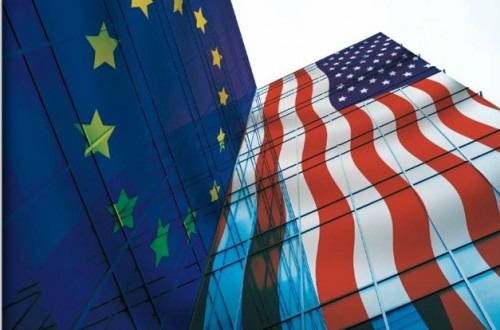
Ukip’s recent electoral success has left trailing in the wake of its nightmares a thousand pundits harrumphing about how – HOW – on earth any working class person could vote for these people. Momentarily ignoring the fact that Ukip enjoys support across all classes, it’s easy to see the point here. Ukip’s crypto-fascist tub-thumping comes packaged up with tax cuts for the highest paid, cuts to welfare spending, privatisation, prison-building, and a joyful dose of every oppressive –ism going. The choice between Ukip and a pro-EU party should be easy. There’s only one problem: certain EU free trade agreements lay out a future eerily similar in spirit and detail to that conjured up in Farage’s febrile imagination. Though it may change its suit and speak in a different language, a ruthlessly capitalist agenda looks pretty much the same wherever it rears its head.
With their top suits a roll call of ex-bankers and businessmen, it’s little wonder that Ukip are more a friend to the employer than the employee. Vague bloviations about ‘cutting red tape’ and ‘health and safety culture’ belie a real and dangerous commitment to stripping away basic employment rights such as maternity leave, sick pay and paid holidays. The policies make an easy contrast with EU directives that currently stipulate a basic minimum standard of working conditions. Nice though it would be to leave it at that, it’s not the whole picture. The will to dismantle hard-fought and hard-won labour protections doesn’t end at the white cliffs of Dover.
The Transatlantic Trade and Investment Partnership (TTIP), an historic free trade agreement currently being negotiated between the US and EU, seeks to ease the flow of national capital across national borders by standardising business legislation in the world’s two largest trading blocs. Under the dubious heading of ‘regulatory harmonisation’, this agreement paves the way for effective deregulation of employment law in which comparatively weak stateside employment legislation becomes the standard template for 40% of the world’s economy. It’s a thorough tooth-extraction for any putative protections on the EU statute books. TTIP also includes the ‘Investor State Dispute Settlement’ scheme (ISDS), a proviso that allows corporations to directly sue governments for potential loss of profit. And since basic dignities like a living wage and paid parental leave are reliably bad for the bottom line, any future government trying to enhance working conditions could find themselves facing down multinational corporations reaching deeply into their pockets for a scourge of lawyers. Effectively enshrining the right to profit in international law, ISDS legislation makes Nigel Farage’s ‘Small Business Manifesto’ look a little amateurish.
Though Ukip’s Paul Nuttall has all the charm and tact of a pair of foetid dingo’s kidneys, he is at least sometimes gratifyingly direct. A post on his website recently lavished praise on the current government for its quest to privatise the National Health Service, arguing that “The very existence of the NHS stifles competition”. The offending post was hastily removed, but privatisation remains a key part of Ukip’s health policy, which proposes to franchise off key services to private companies. It’s at best unoriginal; identical to the programme of piecemeal privatisation being enacted by the current government. Key services are steadily parcelled off to companies such as Serco and G4S whose approach to healthcare fluctuates between inept, indifferent and downright fraudulent. Predictably objectionable stuff from predictably objectionable people, to which the proponents of puclibly-run healthcare rightly object. If they’ve made an enemy of Ukip, they’ll find few allies in the ranks of EU officials negotiating TTIP.
The ‘regulatory harmonisation’, backed up by ISDS, will roll out a US-style legal duty to promote competition in the healthcare sector through mandatory ‘competitive tendering’. This means that individual NHS providers will be obliged to compete with private healthcare companies for the right and budget to provide care. Private companies can afford to run at a loss and slash staffing levels to present the most tantalisingly ‘cost-efficient’ case they can to the Clinical Commissioning Boards – leaving their NHS rivals to spend public time and money hiring consultants, creating bid teams, chasing tenders. It curbs the ability of NHS trusts to plan for care on a long term or a wide scale. It underwrites the kind of privatisation that would make Paul Nuttall drool with longing into his natty purple tie.
Default support of the EU in response to Ukip rings hollow without a criticism of how the organisation is being used to pursue the interests of international capital. It offers little real alternative; little in the way of practical protection of people’s livelihoods, and scant ideological salvation. Where Ukip proposes to starve out the offending parasite of cheap foreign labour with a programme of benefit cuts and business boosts, the EU is leveraging fear of losing jobs to cheap labour in the global economic south to push through regressive legislation. We must, the refrain goes, compete on the global market.
As Westminster braces itself for another Ukip ‘earthquake’ in 2015, battle lines have been drawn around a single question: in or out? At present, neither option is satisfactory. Both promise to entrench the power of capital over people’s lives. Neither offers meaningful sovereignty. If we want to oppose Ukip’s vile dogwhistle politics, we must oppose it at both the national and the international level. If we want to oppose Ukip’s privatisation plans, we must demand that the EU’s trade agreements offer freedom for more than trade and protection for more than profit.
If we want a satisfactory answer, we must change the question.